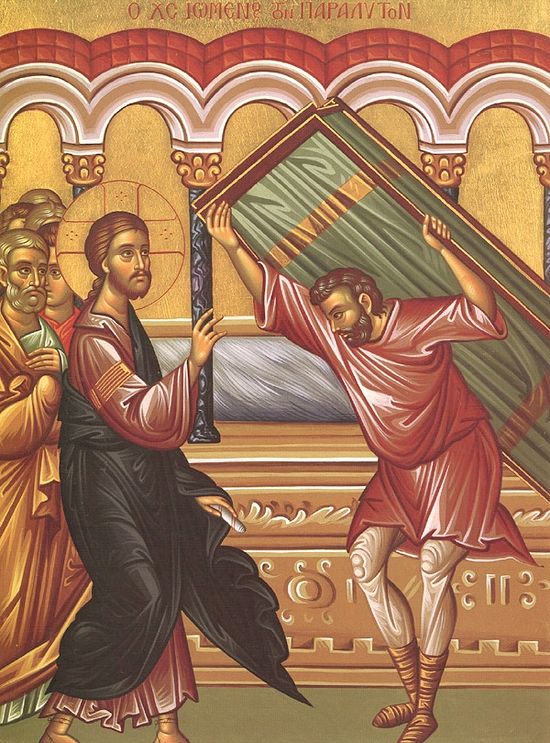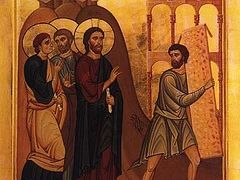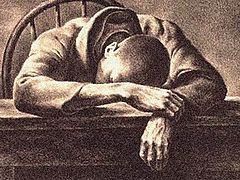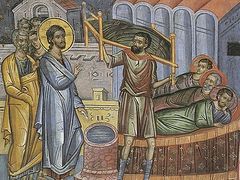Epistle: Acts 9:32-42
Gospel: John 5:1-15
There are two healings from Sunday's readings. The apostle Peter heals the bedridden Aeneas and Jesus heals the paralytic at Bethesda. In both cases, the healings have an evangelical dimension.
We see this clearly, in the first reading. As word spreads of Aeneas being restored to wholeness of body all who dwelt at Lydda and Sharon … turned to the Lord (Acts 9:32, NKJV).
As for the healing in the Gospel, Jesus tells the man, Take up your bed and walk and to sin no more (John 5:8, 14, NKJV). Confronted by the Jews for carrying his bed on the Sabbath when “it is not lawful” for him to do so sets the stage for an initial proclamation of the Gospel (kerygma).
Here’s how it happens.
After he finds Jesus again, and now, secure in his understanding as to what has happened to him, the newly healed man seeks out his critics and tells the that it was Jesus who made him well (John 5:15).
I think sometimes that the evangelical work of the Church is neglected or is deformed because so few of us have experienced the healing mercy of God. Reflecting on the resurrection of Tabitha, St John Chrysostom tells us not to “concern ourselves with grave monuments or memorials.” To this warning, we should add the tendency of some to build intellectual monuments to their own cleverness. Just as some (wrongly) think they honor the dead by works of stone, some imagine (again, wrongly) that they draw others to Christ by clever arguments and the “multiplication of words” (see Matthew 6:7).
This isn’t to denigrate either art or scholarship. It is rather to take seriously what Chrysostom calls “the greatest memorial” for the dead and to which I would add, the greatest witness to the Resurrection. Gather, the saint says, “the widows around; tell them his name; ask them to offer prayers and supplications on his behalf.” Whether the person is dead in the body, or dead is sin, standing before God in prayer is “how to rescue people not from the present death but from the death that is to come” (“Homilies on the Acts of the Apostles,” 21 in ACCS, NT vol V: Acts, p. 116).
Our prayers for others, our acts of mercy for them, don’t just help them, they also transform us. St Cyprian says of Tabitha “So powerful were the merits of mercy, so much did just works avail! She who conferred upon suffering widows the assistance for living deserved to be recalled to life by the petition of widows” (“Works and Almsgiving,” 6 in ACCS, NT vol V: Acts, p. 117). There is nothing that is so much to our own benefit as interceding before God for another. Whether what we offer is spiritual or material, the love of neighbor grants us eternal life. “Look at the gain, look at the harvest,” Chrysostom says of the blessings God poured out on Tabitha, “but note that it was not for display” (“Homilies on the Acts of the Apostles,” 21 in ACCS, NT vol V: Acts, p. 117) but for the sake of those in need.
Without mercy, without prayer—liturgical and personal—the evangelical work of the Church is stillborn; it is just vain repetition and a glorification of my own ego. To see the harm caused when mercy and prayer are absent, we need only turn again to this morning’s Gospel.
Rather than thank God that a child of Abraham loosed from this bond on the Sabbath (Luke 13:16, NKJV), the Jewish leaders condemn the man and, by implication, God Who healed him. It’s easy enough for me to criticize, and even condemn, those who put the Law of Moses (or the canons!) before the mercy of God. And yet, how often have I done the exact same thing? Haven’t I just done this in my example?
Why do we, why do I, do this? Why do I condemn others for the same sin that—in this very moment—I commit?
I do this because I “have forgotten the fundamental truths of Christian life.” I am forgetful because I am “immersed in the darkness of materialism or the exterior and routine performance of ‘ascetic labors'” as Sergius Nilus writes in the introduction to St Seraphim of Sarov‘s On the Acquisition of the Holy Spirit. I am, in other words, in love with the externals of the faith at the expense of my own, inner life the “true aim” of which, according to St Seraphim, is “the acquisition of the Holy Spirit of God.”
The fact is my brothers and sisters, God the Father and our Lord Jesus Christ through the power of the Holy Spirit are at this very moment at work in each and every human heart. My Father has been working until now, and I have been working Jesus tells those who sought all the more to kill Him, because He not only broke the Sabbath, but also said that God was His Father, making Himself equal with God (John 5:18, NKJV).
No one comes to the Church except by the prompting of God and because of an experience, however obscure, of His great mercy. It is our great privilege—mine as well as yours—to help people discern the presence of God in their lives. It is our calling as Orthodox Christians first to help people understand the faith that God has planted in their hearts. And and then, second, God has called us to foster that faith so that they, in turn, can be able to assist others in saying “Yes!” to God.
Fidelity to our vocation requires that we be men and women of prayer. But even prayer is not enough. St Seraphim says that
… prayer, fasting, vigil and all the other Christian practices may be, they do not constitute the aim of our Christian life. Although it is true that they serve as the indispensable means of reaching this end, the true aim of our Christian life consists of the acquisition of the Holy Spirit of God. As for fasts, and vigils, and prayer, and almsgiving, and every good deed done for Christ’s sake, are the only means of acquiring the Holy Spirit of God. Mark my words, only good deeds done for Christ’s sake brings us the fruits of the Holy Spirit.
One month from today we will celebrate the Feast of Pentecost. Let us, each of us, stand before God in the coming days and weeks and ask Him to renew in us the grace of the Holy Spirit so that, like the Apostle Peter, we can give an effective witness to the mercy of God to all we meet.
Christ is Risen!




